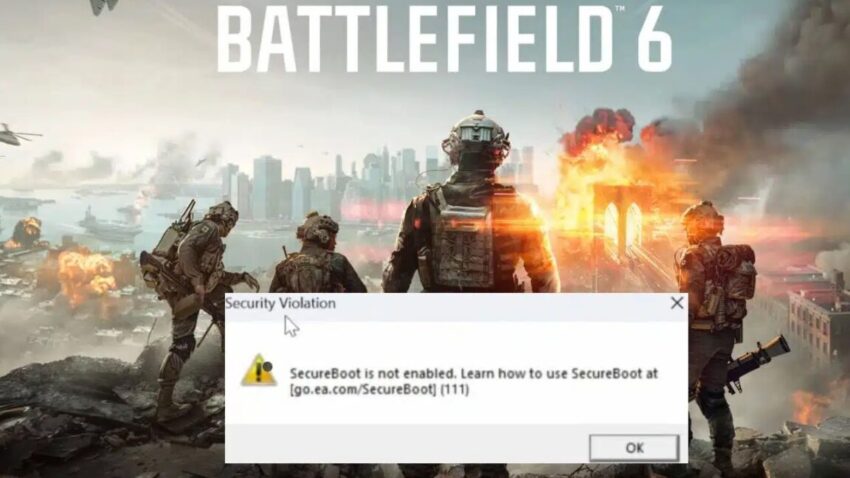
battlefield 6 dev apologizes for requiring secure — EA's recent decision to require Secure Boot for its upcoming Battlefield 6 open beta has sparked significant backlash from the gaming community..
EA’s recent decision to require Secure Boot for its upcoming Battlefield 6 open beta has sparked significant backlash from the gaming community.
battlefield 6 dev apologizes for requiring secure
Background on Secure Boot and Its Implications
battlefield 6 dev apologizes for requiring secure: key context and updates inside.
Secure Boot is a security feature designed to ensure that a device boots using only software that is trusted by the manufacturer. This feature is part of the Unified Extensible Firmware Interface (UEFI) specification and is intended to protect the system from malware and unauthorized software during the boot process. While Secure Boot can enhance security, it also introduces complications for users, particularly gamers who may not have the technical expertise to navigate BIOS settings or who may be using older hardware that does not support this feature.
In the context of gaming, particularly competitive titles like Battlefield 6, the need for robust anti-cheat measures has become increasingly critical. Cheating not only undermines the integrity of the game but also frustrates honest players, leading to a diminished gaming experience. As a result, developers have been exploring various methods to combat cheating, including kernel-level anti-cheat systems that require deeper access to the operating system.
EA’s Decision and Community Reaction
Earlier this month, EA announced that players participating in the Battlefield 6 open beta on PC would need to enable Secure Boot in their Windows operating system and BIOS settings. This announcement was met with immediate criticism from the gaming community. Many players expressed frustration over the requirement, particularly those who encountered difficulties enabling Secure Boot or who were unwilling to grant EA’s anti-cheat tools kernel-level access to their systems.
Critics argue that requiring Secure Boot could alienate a segment of the player base, particularly those with older hardware or those who prioritize system security and privacy. The backlash highlights a broader concern within the gaming community regarding the balance between security measures and user accessibility. Players have voiced their concerns on various forums and social media platforms, emphasizing that such requirements could lead to a fragmented player base and potentially diminish the game’s popularity.
Technical Director’s Apology and Defense
In response to the controversy, Battlefield 6’s technical director, Christian Buhl, took to the media to address the backlash. In an interview with Eurogamer, Buhl acknowledged the challenges posed by the Secure Boot requirement and expressed regret for any players it may have deterred from participating in the open beta.
“The fact is I wish we didn’t have to do things like Secure Boot,” Buhl stated. “It does prevent some players from playing the game. Some people’s PCs can’t handle it and they can’t play: that really sucks. I wish everyone could play the game with low friction and not have to do these sorts of things.”
Buhl’s comments reflect a recognition of the delicate balance developers must strike between implementing necessary security measures and ensuring a smooth user experience. His apology indicates an understanding of the frustrations faced by players, particularly those who may not have the technical knowledge or resources to adjust their systems accordingly.
Broader Implications for Game Development
The requirement for Secure Boot in Battlefield 6 raises important questions about the future of game development and the ongoing battle against cheating in online multiplayer games. As developers increasingly turn to advanced security measures, the implications for player accessibility and system requirements become more pronounced.
One potential outcome of this trend is a widening gap between players who can meet the technical requirements of modern games and those who cannot. This divide could lead to a more exclusive gaming environment, where only those with the latest hardware and technical know-how can fully enjoy new releases. Such a scenario could ultimately harm the gaming community as a whole, as it may discourage casual gamers from participating in competitive titles.
Stakeholder Reactions
The reactions from various stakeholders in the gaming industry have been mixed. On one hand, some developers and industry experts support the implementation of stricter security measures, arguing that they are necessary to maintain the integrity of competitive gaming. They contend that the rise of cheating has reached a critical point, necessitating more robust solutions to protect players and ensure fair play.
On the other hand, many players and consumer advocates have raised concerns about the potential overreach of security measures. They argue that while combating cheating is essential, it should not come at the expense of user accessibility and privacy. The debate highlights the ongoing tension between security and user experience in the gaming industry, a dynamic that is likely to continue as technology evolves.
Looking Ahead: The Future of Anti-Cheat Measures
As the gaming landscape continues to evolve, developers will need to find innovative solutions to combat cheating while also considering the needs and concerns of their player base. The controversy surrounding Battlefield 6’s Secure Boot requirement serves as a reminder of the challenges that lie ahead.
One potential avenue for addressing these challenges is the development of more user-friendly security measures that do not require extensive technical knowledge to implement. This could involve creating clearer instructions for enabling Secure Boot or exploring alternative anti-cheat solutions that do not necessitate kernel-level access.
Additionally, developers may need to engage more actively with their communities to understand player concerns and preferences. By fostering open dialogue and soliciting feedback, game developers can better align their security measures with the expectations of their player base, ultimately creating a more inclusive gaming environment.
Conclusion
The requirement for Secure Boot in Battlefield 6’s open beta has sparked a significant debate within the gaming community about the balance between security and accessibility. While EA’s decision is rooted in the need to combat cheating, it has raised concerns about the potential alienation of players who may struggle with the technical requirements. As the industry moves forward, developers will need to navigate these complexities carefully, ensuring that they protect the integrity of their games while also fostering an inclusive environment for all players.
Source: Original report
Related: More technology coverage
Further reading: related insights.
Further reading: related insights.
Further reading: related insights.
Was this helpful?
Last Modified: September 1, 2025 at 10:46 pm
2 views















